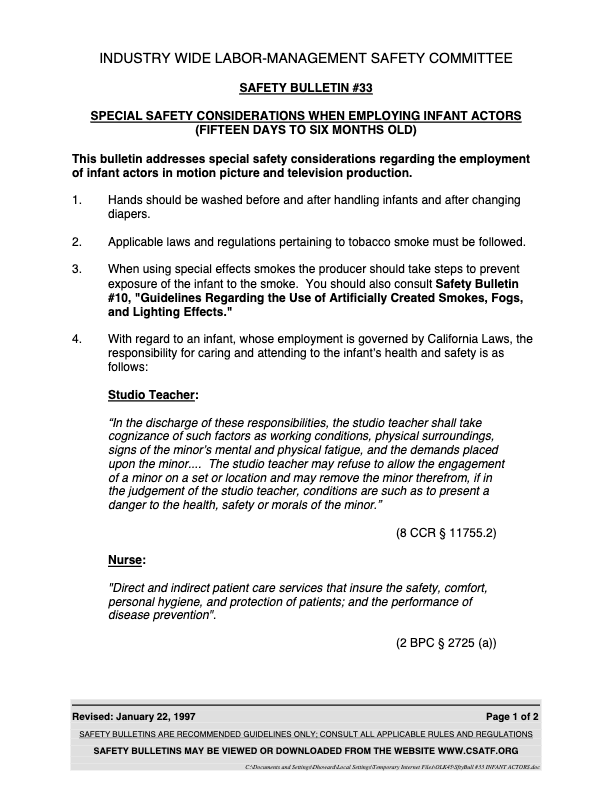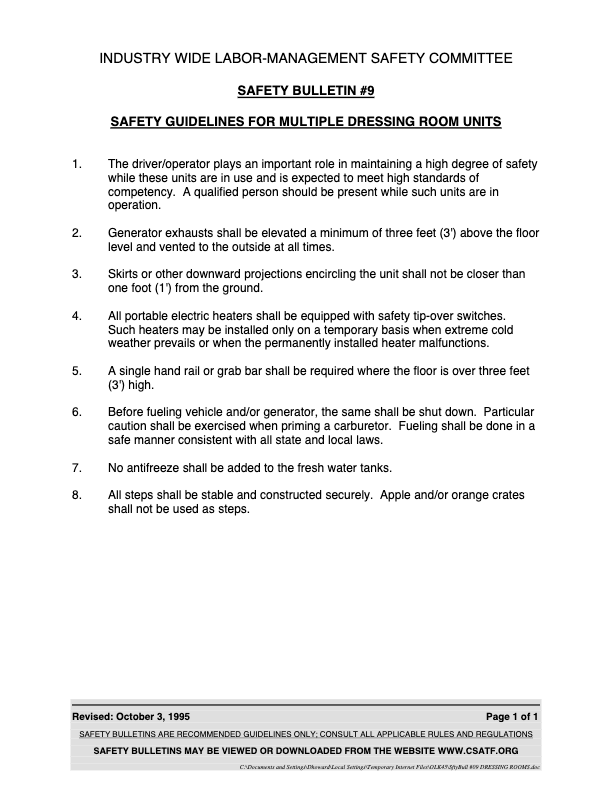Safety Bulletin

Guidelines
This bulletin addresses special safety considerations regarding the employment of infant actors (fifteen-days to six-months old) in motion picture and television production.
- Hands should be washed before and after handling infants and after changing diapers.
- Applicable laws and regulations pertaining to tobacco smoke must be followed.
- When using special effects smokes the producer should take steps to prevent exposure of the infant to the smoke. You should also consult Safety Bulletin: Artificial Fog and Haze.
- With regard to an infant, whose employment is governed by California Laws, the responsibility for caring and attending to the infant’s health and safety is as follows:
- Studio Teacher: “In the discharge of these responsibilities, the studio teacher shall take cognizance of such factors as working conditions, physical surroundings, signs of the minor’s mental and physical fatigue, and the demands placed upon the minor…. The studio teacher may refuse to allow the engagement of a minor on a set or location and may remove the minor therefrom, if in the judgement of the studio teacher, conditions are such as to present a danger to the health, safety or morals of the minor.”
- Nurse: “Direct and indirect patient care services that insure the safety, comfort, personal hygiene, and protection of patients; and the performance of disease prevention.”
- For infants subject to laws other than California’s, an appropriate person should be designated responsible for that infant’s health and safety. That person should make the determination as to whether or not a hazard exists and take appropriate action as described in this paragraph. If unsafe conditions are suspected by the Studio Teacher or nurse, a studio safety professional, if available, should be called for consultation, as required by the production’s Injury and Illness Prevention Program.
- Trailer holding tanks should not be pumped while the infant is present or immediately prior to the infant’s arrival. The trailer should be well ventilated prior to the arrival of the infant.
- When substances are used for altering an infant’s appearance, provisions should be made for bathing the infant.
- Foods which commonly cause allergic reactions should not be used to alter the appearance of the infant’s skin, unless their use is specifically approved by a medical doctor. These foods include, but are not limited to: raspberry and strawberry jams, jellies and preserves.
- Consumer products including glycerin, lubricating jellies, and cosmetics, should not be used to alter an infant’s appearance. Permission should be obtained from the parent or guardian prior to applying any substance to the infant’s skin.
- Once wardrobe and props have been issued by the production for use on/with an infant, the wardrobe and props should not be reissued for another infant without laundering wardrobe and disinfecting props.
- Infant accessories should not be exchanged from one infant to another without first having been sanitized, (bottles, nipples and pacifiers should not be exchanged between infants).
Note: All production personnel working with infants are urged to review the “Blue Book,” entitled “The Employment of Minors in the Entertainment Industry,” published by the Studio Teachers, Local 884, IATSE. Reference should also be made to the extensive federal and state labor laws and to any applicable collective bargaining agreements which govern the employment of child actors.

